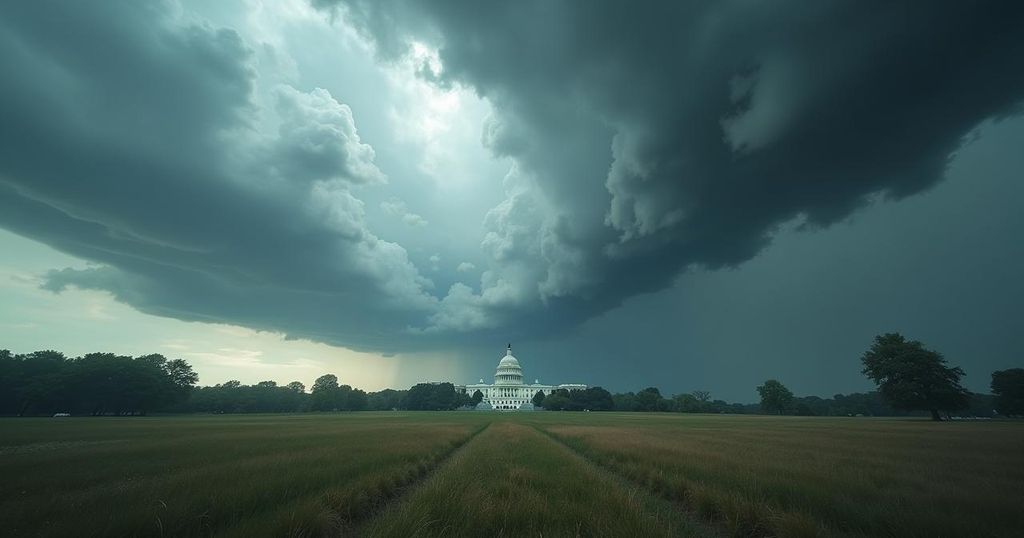Hurricane Milton struck Florida’s west coast, but its impact was less severe than anticipated, raising questions about the efficacy and motivations behind the federal government’s preemptive warnings. The response can be seen as an effort to counter misinformation stemming from previous storms. Increased skepticism among some residents could lead to potential challenges in future evacuations as the political landscape continues to evolve ahead of the election.
Hurricane Milton, which recently impacted Florida’s west coast, did not manifest into the catastrophic event many had anticipated. As I traversed north from Fort Myers along the affected coastline, it became evident that the extensive pre-storm alerts may have been a reaction by the Biden administration to counteract the misinformation and skepticism propagated by former President Donald Trump and his associates. The enormity of the warnings amplified due to meteorologists’ concerns over the storm’s unusual behavior, as it fluctuated north and south prior to landfall. Initially classified as a category 5 hurricane, Milton downgraded to a category 3 as it approached Florida, significantly reducing wind threats, though the potential for dangerous storm surges remained. My first stop at Punta Gorda revealed overturned boats but minimal structural damage. Proceeding further, Venice showcased storm debris, with signs of disruption yet no catastrophic outcomes. In Casey Key, despite being shielded from vehicular access, the National Guard and local officials conducted house checks, discovering surges within residences that were lower than expected, thus presenting relief to the local populace. Continuing our inspection along major infrastructures, such as the Sunshine Skyway Bridge, ensured public safety and facilitated access to St. Petersburg. Here, the focus shifted to Tropicana Field, which unfortunately sustained damage as it served as a temporary shelter for emergency responders. As the hurricane season progresses, the fortunate outcome for Florida’s west coast is partially attributed to effective evacuation measures. However, this has led to a critical perspective among some residents who felt authorities may have overstated the threat. The mayor of Tampa had previously declared that staying could result in fatal consequences; however, the lack of high-profile casualties prompted skepticism regarding the severity of the situation. Some speculate that the Biden administration’s heightened alerts stemmed from recent experiences surrounding Hurricane Helene and the subsequent criticism from Trump regarding federal response efforts. The FEMA Administrator even referenced the invasion of conspiracy theories surrounding weather control, suggesting an unprecedented level of misinformation had influenced public sentiment and preparation efforts for Milton. In conclusion, Hurricane Milton’s impact, while concerning, did not reach the feared proportions, yet it undeniably catalyzed discourse surrounding political maneuvers and public perceptions. As the United States approaches the impending election, the ongoing turbulence within the political landscape suggests that the true storm may be just beginning.
The article discusses the impact of Hurricane Milton on Florida’s west coast, contrasting the actual storm damage with the intense warnings issued by authorities. The context reflects a broader narrative concerning governmental responses to natural disasters amidst a politically charged environment, particularly after the misinformation campaigns led by former President Trump following prior hurricanes. The article examines public sentiment towards these warnings, especially as they relate to political accountability and the preparedness of federal agencies like FEMA.
Hurricane Milton, while feared to be devastating, ultimately caused minimal damage due to effective evacuation measures and perhaps an overestimation of its potential impact. This situation has incited discussions about political accountability and the administration’s handling of storm preparedness. As the political landscape heats up with the upcoming election, the discourse surrounding Milton serves as a reminder of the ongoing intersection of natural events and political narratives.
Original Source: news.sky.com






